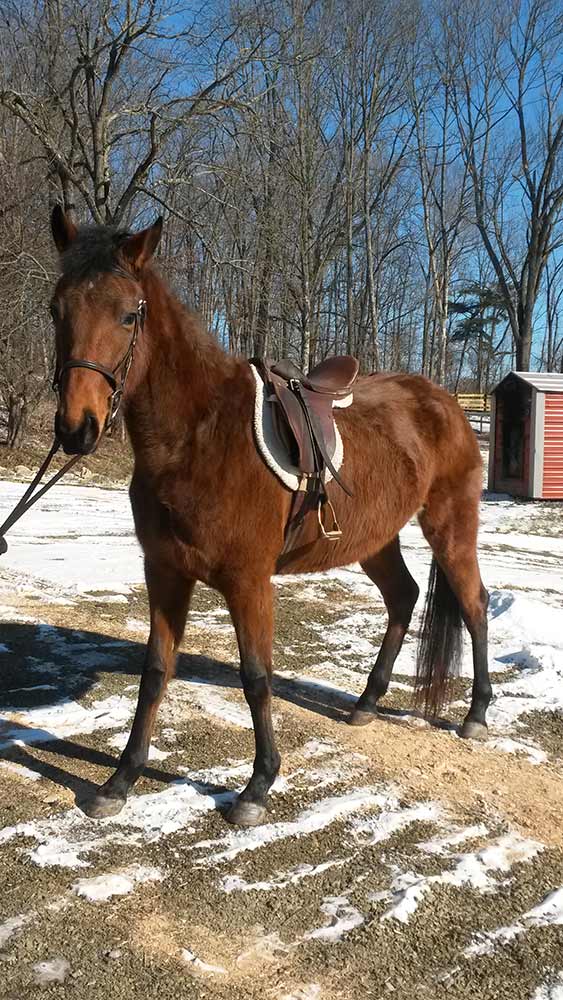 Violet is one of the Morgan mares seized two years ago, who are still being cared for by the Humane Society of Harrisburg.
Violet is one of the Morgan mares seized two years ago, who are still being cared for by the Humane Society of Harrisburg.
Two years after more than two dozen starving Morgan horses were pulled from a manure-filled paddock in Dauphin County they remain in the care of the humane society that rescued them.
The vet bills have topped $200,000 and there is no end in sight for the largest animal seizure in the century-plus history of Humane Society of Harrisburg Area.
And now the case is turning into the nonprofit group’s longest-ever rescue.
Owner Rebecca Roberts, who ran Shadowland Morgans and Sport Horses breeding farm in Palmyra, was convicted of animal cruelty in district court in April 2013 and appealed the case in Dauphin County court.
Since then her attorney has filed dozens of motions, delaying the trial for 20 months. At press time a hearing had been scheduled for March 18 in Dauphin County Court.
As the delays dragged on and donations dried up, the humane society has been forced to dig deep into its bank account to support the horses, an ongoing expense that threatens other life-saving programs.
“It’s frustrating,” said Amy Kaunus, the society’s executive director. “We are at a point where we have to look at cutting other programs and services to take care of these horses.”
The 32 surviving horses are scattered across two states, some living at the humane society barn, others at foster farms and professional boarding facilities, where monthly bills are in the thousands, she said.
In April 2013 when the humane society presented its cases, the details of conditions at Roberts’ farm four months earlier shocked Magisterial District Lowell Witmer. There was no hay, no water, horses were forced to stand in knee-deep mud and atop mountains of manure five feet high. In the corner of the dilapidated run-in shed were the decomposing bodies of dead horses and the skeletal remains of others were found in fields.
There were 29 horses removed in two raids - pregnant mares, yearlings, stallions and one horse so weak it had to be carried onto the trailer.
Witmer found Roberts guilty on 30 counts of cruelty and ordered her to pay $27,638 in restitution, forbid her from owning or having contact with animals for seven years and five months and issued a $22,500 fine.
The judge declined to send her jail because he said she clearly needed psychological help and urged her lawyer to help her get treatment.
In response Roberts appealed, seeking first to throw out the conviction on procedural grounds and when that failed, requested a new trial. Her lawyer Eric Winter, who could not be reached for comment, told Pennsylvania Equestrian early last year that the horses weren’t in “perfect shape” but their conditions did not amount to cruelty.
Since the raids scores of volunteers and paid professionals have cared for the Morgans who were unhandled - virtually wild - with no lack of human contact. Weeks turned to months, turned to years of hard work, punctuated by moments of joy and tragedy.
Five foals were born and survived despite the fact that their dams were badly undernourished. The lone gelding in the herd, an aged Morgan named Walter was loaned out to a summer riding camp last year where he was a “favorite” among the children, Kaunas said.
But a stallion had to be euthanized after severing his leg on wire fencing while trying to escape from a pasture in Maryland and a mare bled to death after giving birth to a stillborn foal – likely the result of poor nutrition.
Extensive Training
On a December morning novice trainer Hope LaLone was lunging her charge, Violet, a three-year -old mare, full of energy and bucking in the stiff breeze. She is among five Morgans in training at the farm north of Harrisburg that was purchased by the humane society following the seizure. All the horses needed extensive training on ground manners and none had been worked under saddle.
Violet, a sweet-faced bay pony, is all but unrecognizable as a Morgan horse. A healthy, well-bred Morgan is compact, defined by a broad chest, refined head and gracefully arched neck.
Her slight build, which may be related to her early starvation, obscures any breed characteristics and makes her look younger than her years. As low horses in the herd hierarchy, she and other yearlings bore the brunt of the struggle for food in the Roberts’ field, Kaunus said.
“The ‘tweens’ suffered the most developmentally,” she said. “The older horses are imprinted with fear.”
Still Violet and the others have come a long way from the skittish youngsters living in a dung heap. She stands quietly while her feet are picked and after regular ground work is making progress under saddle, Lelone said.
Serge, a stallion almost euthanized because he could not be controlled, remains in professional training at Sunset Valley Farm in Union Bridge, Md. and another group are being cared for at a boarding facility in Mt. Airy, Md.
Dauphin County District Attorney Ed Marsico said he will seek restitution from Roberts, who herself is an attorney, but admits it is difficult to convince a judge to impose full restitution and to collect the money.
“In these cases, I’m not sure what the success rate will be,” he said. So far Roberts has paid $68 in court fees, according to court records.
Until the case is over, Kaunas and her team of volunteers and equine professionals will be working to ensure all the horses are “adoption ready” and can be easily handled and safely ridden.
“We have an obligation to all animals to the point of adoption,” said Kaunas. “We have to see that through.”




